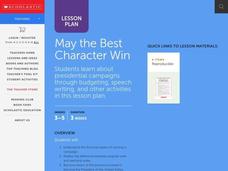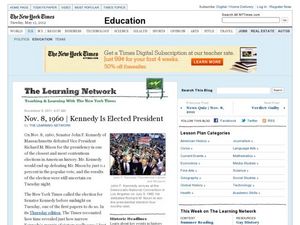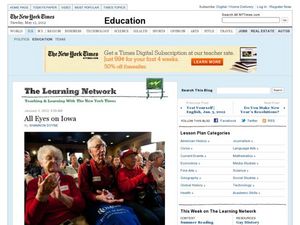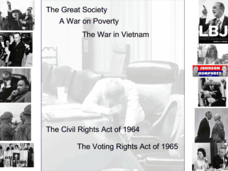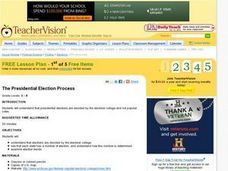Curated OER
May the Best Character Win
Running an election campaign takes money. Class groups must effectively budget money in order to design and purchase sufficient advertising aimed at procuring classmates' votes. After completing an online tutorial, they also write and...
Curated OER
What Are the Important Issues?
Students determine the most important issue of the current campaign. They follow a multi-step voting process to determine the most important issue(s) of the current campaign. They document the final vote on five important issues by...
Jefferson County Schools
A Canned Lesson
Follow the steps outlined in an excellent presentation to create graphic organizers and write persuasive essays with your class. The graphic organizer is effective and translates easily into a final written product. The lesson focuses in...
Curated OER
Nov. 8, 1960 | Kennedy Is Elected President
Using the presidential election of 1960 as background information, learners consider the push of electoral reform. They read about the events and issues surrounding President Kennedy's win in 1960 and compare them to the same issues...
Curated OER
INVITING CANDIDATES TO CLASS
Students explore the election process by researching politcal platforms, inviting candidates to speak, surveying registered voters, and running a mock election.
Curated OER
All Eyes on Iowa
Guid your learners as they become informed members of our community. They'll consider each of the seven questions as they read the New York Times article "All Eye on Iowa." This article relates topics dealing with the 2012 presidential...
Curated OER
The Constitution and the Right to Vote: Ch 6
The US Constitution dictates which members of society have the right to vote. After reading about amendments extending voting rights, your class answers these questions on the 15th, 14th, and 23rd amendments. Use as a quiz or to guide...
Curated OER
Cartoons for the Classroom: Campaign Echoes
Get on those thinking caps, because your class is going to analyze a political cartoon related to the 2008 presidential elections. Included is a large image of the cartoon, background information, and three guiding questions which can be...
Curated OER
The Nominating Process
Ten questions engage students in thinking about what they have read. They are quizzed on basic concepts related to the nomination process and primary elections.
Curated OER
Meet the Press
Students participate in a role play revolving around political elections. The roles of candidate, campaign manager, and journalist emphasized in this activity. Students listen to candidate interviews that are available online.
Curated OER
Convey Ideas in Writing
Use the platforms of the 2004 presidential candidates to bring persuasive writing to your class. Young voters identify the three issues most important to them in the election and research the issues and candidates' positions. They write...
Curated OER
The Last Word: Using Critical Thinking and Analysis to Reach a Decision
Want to explore the process of writing a persuasive essay and tie it in with the upcoming elections? Class members use Venn diagrams and the hamburger model of persuasive writing to write a five-paragraph essay on elections and...
Curated OER
What Are the Issues?
Investigate and report on three issues related to a current election. Elementary aged learners research information about specific issues, develop an opinion, and write a persuasive essay using supporting details and evidence to support...
Curated OER
President LBJ
Here's a quick look at the Johnson presidency. Each of his major acts are discussed with images and video web links. The Voting Rights Act, Tet Offensive, Civil Rights Act, and War on Poverty are defined.
Curated OER
The Election of Barack Obama 44th President of the United States
Students consider the historic implications of Barack Obama's election. In this election of 2008 lesson, students research Obama's accomplishments and determine how his election signifies the success of the American Civil Rights...
College Board
Civic Knowledge and Action: Voter Registration
What does the data say? Using provided voter data from the 2016 presidential election, scholars describe the data and identify questions they could answer by analyzing it. Learners then construct tables and use them to determine whether...
Illustrative Mathematics
Voting for Three, Variation 2
Here is another opportunity for math students to apply reasoning to solve real-world problems with ratios. The ratio of the number of votes for two candidates is provided. Your class is asked to use this ratio and information given about...
Illustrative Mathematics
Election Poll, Variation 1
Your class will learn what it means to take a random sample of a population and to draw inferences from the information gained. In part a, of the exercise, you discuss with your class how learners during a class election can be best...
Education World
Every Day Edit - Voting Rights Act of 1965
In this everyday editing worksheet, students correct grammatical mistakes in a short paragraph about the Voting Rights Act of 1965. The errors range from grammar, spelling, punctuation, and capitalization.
Illustrative Mathematics
Voting for Three, Variation 3
Get your learners to think outside the box. Students require a good understanding of ratios and their relationship to fractions to complete the problem. The only quantities given in the problem are the ratio of the number of votes for...
Curated OER
The Presidential Election Process
Young scholars examine the presidential election process and discover that presidential elections are decided by the electoral college and not popular votes. They see that each state has a number of electors, and understand how this...
Curated OER
Election Day Lesson: The True Story of the Three Little Pigs
Students read the story, The True Story Of The 3 Little Pigs and discuss the voting process. In this public opinion lesson plan, students review the original story of the three little pigs and then read the wolf's version of the...
Curated OER
Rocking the Vote
Students explore how a presidential candidate can win the popular vote but not receive enough electoral votes to win the election. They analyze various regions' voting trends, explore how these trends reflect the outcome of the 2004...
Curated OER
Lose a Vote, Gain a Vote
Students explore the issues behind close Senatorial races. They investigate the qualities of political leaders, the 2002 senatorial elections and the differences and similarities between the Republican and Democratic parties.


